Exploring Healthcare Ethics, Morals, and Laws in a Brain Tumour Case
VerifiedAdded on 2023/01/13
|10
|3608
|95
Essay
AI Summary
This essay delves into the intricate landscape of healthcare ethics, morals, and laws, using a brain tumour case study to illustrate key concepts. It explores ethical principles like autonomy, beneficence, and non-maleficence, alongside relevant legislation such as the Mental Capacity Act and the Human Rights Act. The essay examines issues of informed consent, patient rights, confidentiality, and the roles of legal frameworks like the Equality Act. It further investigates the implications of minors' rights, the application of Fraser guidelines, and the significance of the duty of care, including the Caldicott Principles. The discussion encompasses the challenges of decision-making, the importance of patient privacy, and the impact of discrimination and stigmatization. By analyzing these elements, the essay aims to provide a comprehensive understanding of the ethical and legal considerations in healthcare, particularly concerning complex medical conditions such as brain tumours.
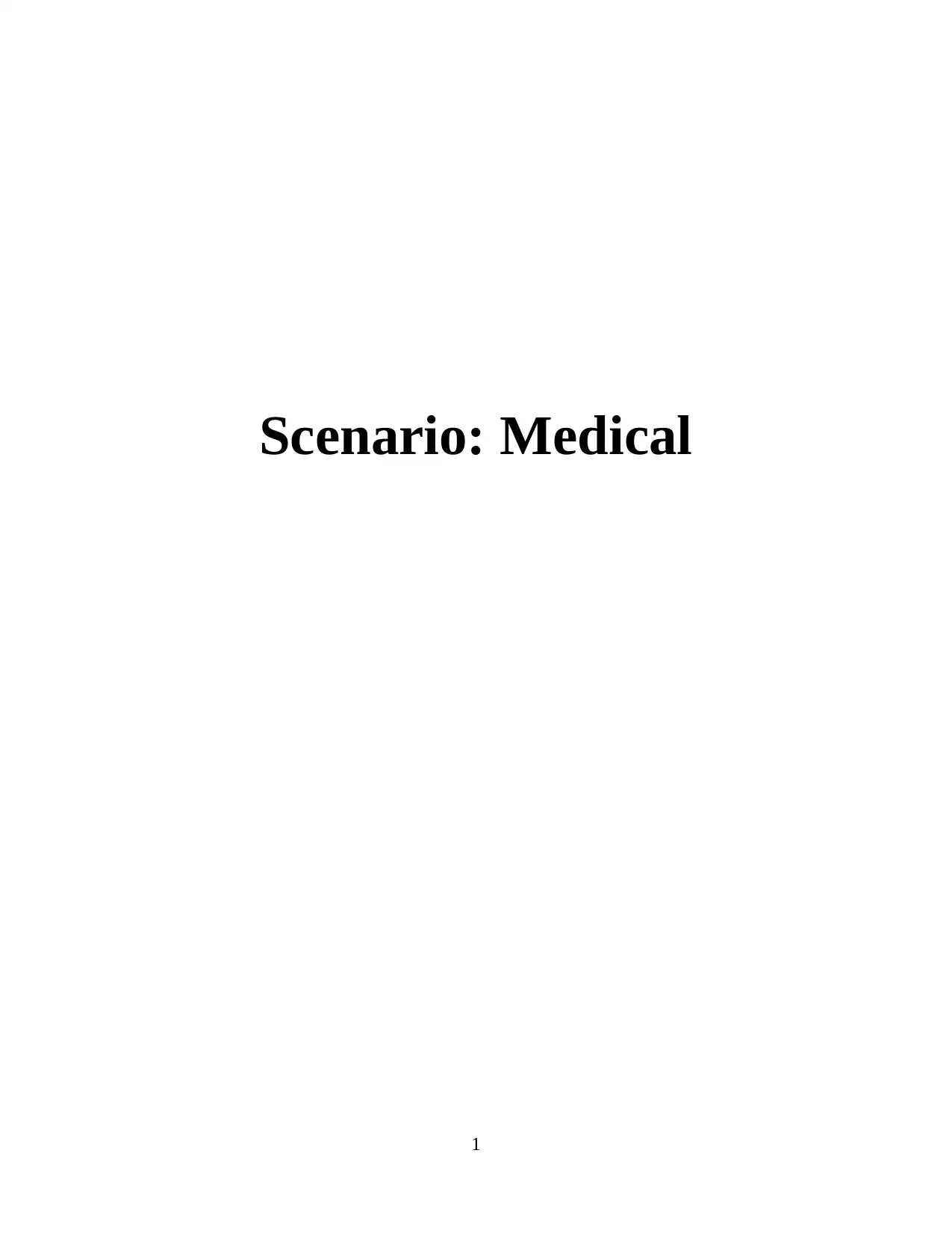
Scenario: Medical
1
1
Paraphrase This Document
Need a fresh take? Get an instant paraphrase of this document with our AI Paraphraser
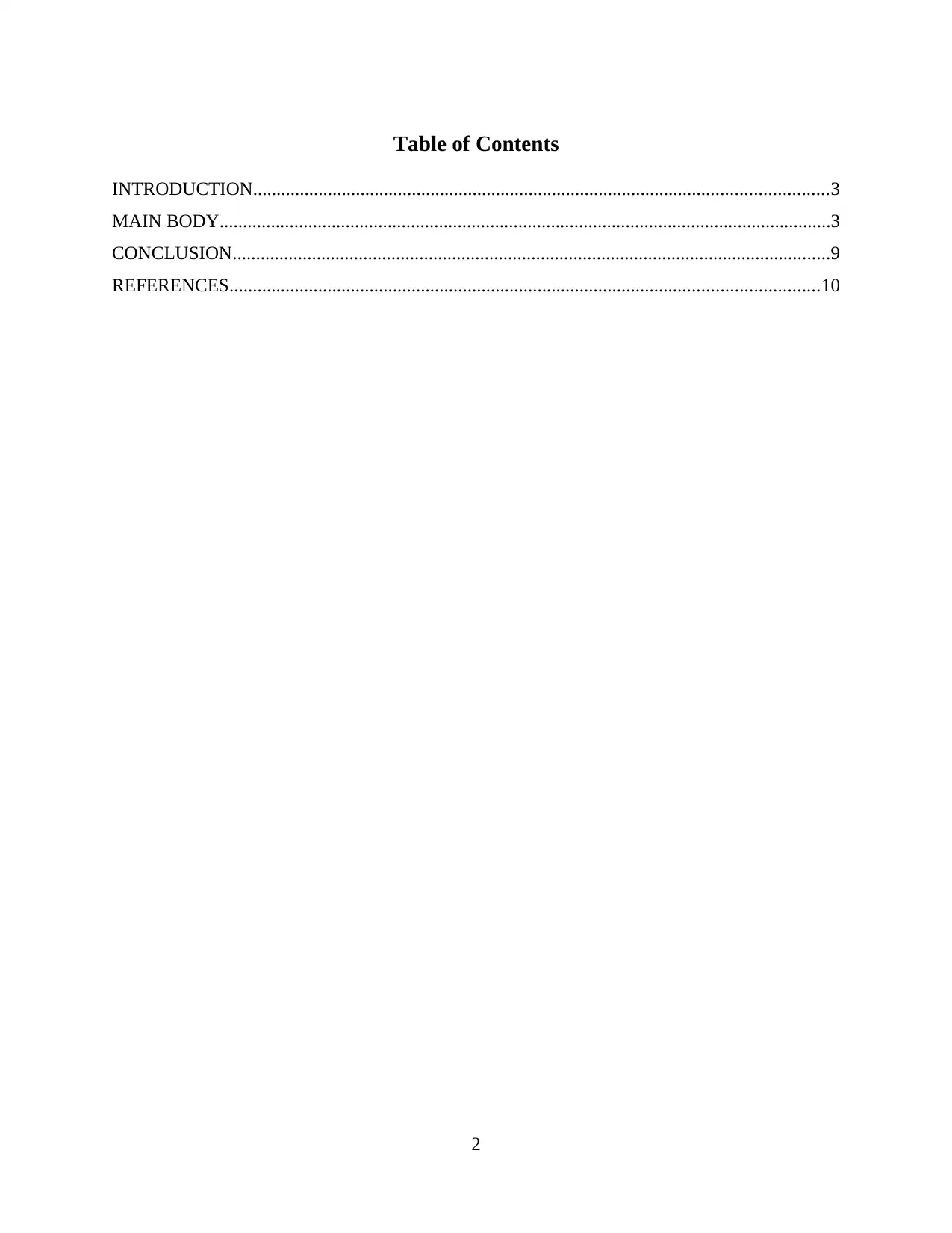
Table of Contents
INTRODUCTION...........................................................................................................................3
MAIN BODY...................................................................................................................................3
CONCLUSION................................................................................................................................9
REFERENCES..............................................................................................................................10
2
INTRODUCTION...........................................................................................................................3
MAIN BODY...................................................................................................................................3
CONCLUSION................................................................................................................................9
REFERENCES..............................................................................................................................10
2
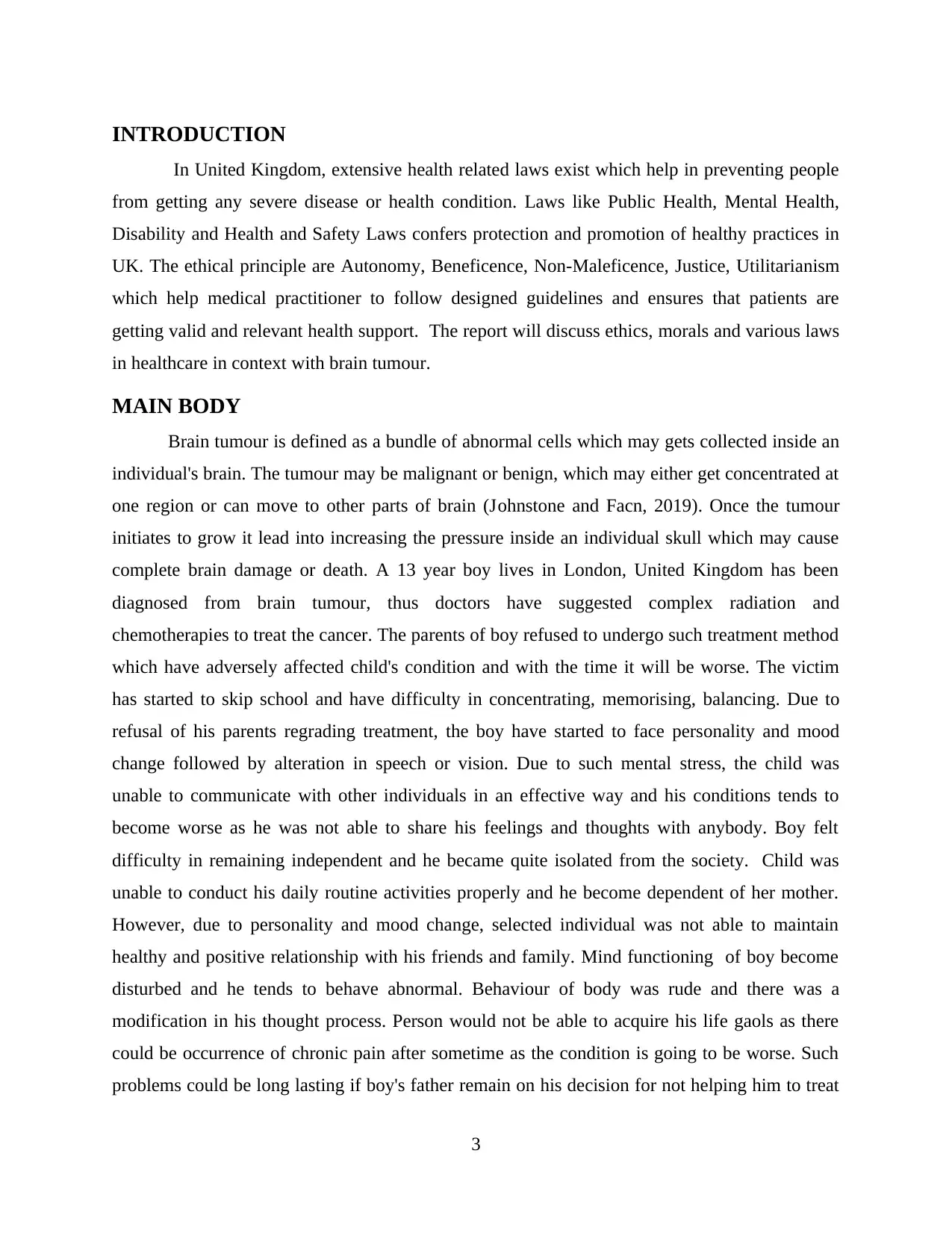
INTRODUCTION
In United Kingdom, extensive health related laws exist which help in preventing people
from getting any severe disease or health condition. Laws like Public Health, Mental Health,
Disability and Health and Safety Laws confers protection and promotion of healthy practices in
UK. The ethical principle are Autonomy, Beneficence, Non-Maleficence, Justice, Utilitarianism
which help medical practitioner to follow designed guidelines and ensures that patients are
getting valid and relevant health support. The report will discuss ethics, morals and various laws
in healthcare in context with brain tumour.
MAIN BODY
Brain tumour is defined as a bundle of abnormal cells which may gets collected inside an
individual's brain. The tumour may be malignant or benign, which may either get concentrated at
one region or can move to other parts of brain (Johnstone and Facn, 2019). Once the tumour
initiates to grow it lead into increasing the pressure inside an individual skull which may cause
complete brain damage or death. A 13 year boy lives in London, United Kingdom has been
diagnosed from brain tumour, thus doctors have suggested complex radiation and
chemotherapies to treat the cancer. The parents of boy refused to undergo such treatment method
which have adversely affected child's condition and with the time it will be worse. The victim
has started to skip school and have difficulty in concentrating, memorising, balancing. Due to
refusal of his parents regrading treatment, the boy have started to face personality and mood
change followed by alteration in speech or vision. Due to such mental stress, the child was
unable to communicate with other individuals in an effective way and his conditions tends to
become worse as he was not able to share his feelings and thoughts with anybody. Boy felt
difficulty in remaining independent and he became quite isolated from the society. Child was
unable to conduct his daily routine activities properly and he become dependent of her mother.
However, due to personality and mood change, selected individual was not able to maintain
healthy and positive relationship with his friends and family. Mind functioning of boy become
disturbed and he tends to behave abnormal. Behaviour of body was rude and there was a
modification in his thought process. Person would not be able to acquire his life gaols as there
could be occurrence of chronic pain after sometime as the condition is going to be worse. Such
problems could be long lasting if boy's father remain on his decision for not helping him to treat
3
In United Kingdom, extensive health related laws exist which help in preventing people
from getting any severe disease or health condition. Laws like Public Health, Mental Health,
Disability and Health and Safety Laws confers protection and promotion of healthy practices in
UK. The ethical principle are Autonomy, Beneficence, Non-Maleficence, Justice, Utilitarianism
which help medical practitioner to follow designed guidelines and ensures that patients are
getting valid and relevant health support. The report will discuss ethics, morals and various laws
in healthcare in context with brain tumour.
MAIN BODY
Brain tumour is defined as a bundle of abnormal cells which may gets collected inside an
individual's brain. The tumour may be malignant or benign, which may either get concentrated at
one region or can move to other parts of brain (Johnstone and Facn, 2019). Once the tumour
initiates to grow it lead into increasing the pressure inside an individual skull which may cause
complete brain damage or death. A 13 year boy lives in London, United Kingdom has been
diagnosed from brain tumour, thus doctors have suggested complex radiation and
chemotherapies to treat the cancer. The parents of boy refused to undergo such treatment method
which have adversely affected child's condition and with the time it will be worse. The victim
has started to skip school and have difficulty in concentrating, memorising, balancing. Due to
refusal of his parents regrading treatment, the boy have started to face personality and mood
change followed by alteration in speech or vision. Due to such mental stress, the child was
unable to communicate with other individuals in an effective way and his conditions tends to
become worse as he was not able to share his feelings and thoughts with anybody. Boy felt
difficulty in remaining independent and he became quite isolated from the society. Child was
unable to conduct his daily routine activities properly and he become dependent of her mother.
However, due to personality and mood change, selected individual was not able to maintain
healthy and positive relationship with his friends and family. Mind functioning of boy become
disturbed and he tends to behave abnormal. Behaviour of body was rude and there was a
modification in his thought process. Person would not be able to acquire his life gaols as there
could be occurrence of chronic pain after sometime as the condition is going to be worse. Such
problems could be long lasting if boy's father remain on his decision for not helping him to treat
3
⊘ This is a preview!⊘
Do you want full access?
Subscribe today to unlock all pages.

Trusted by 1+ million students worldwide
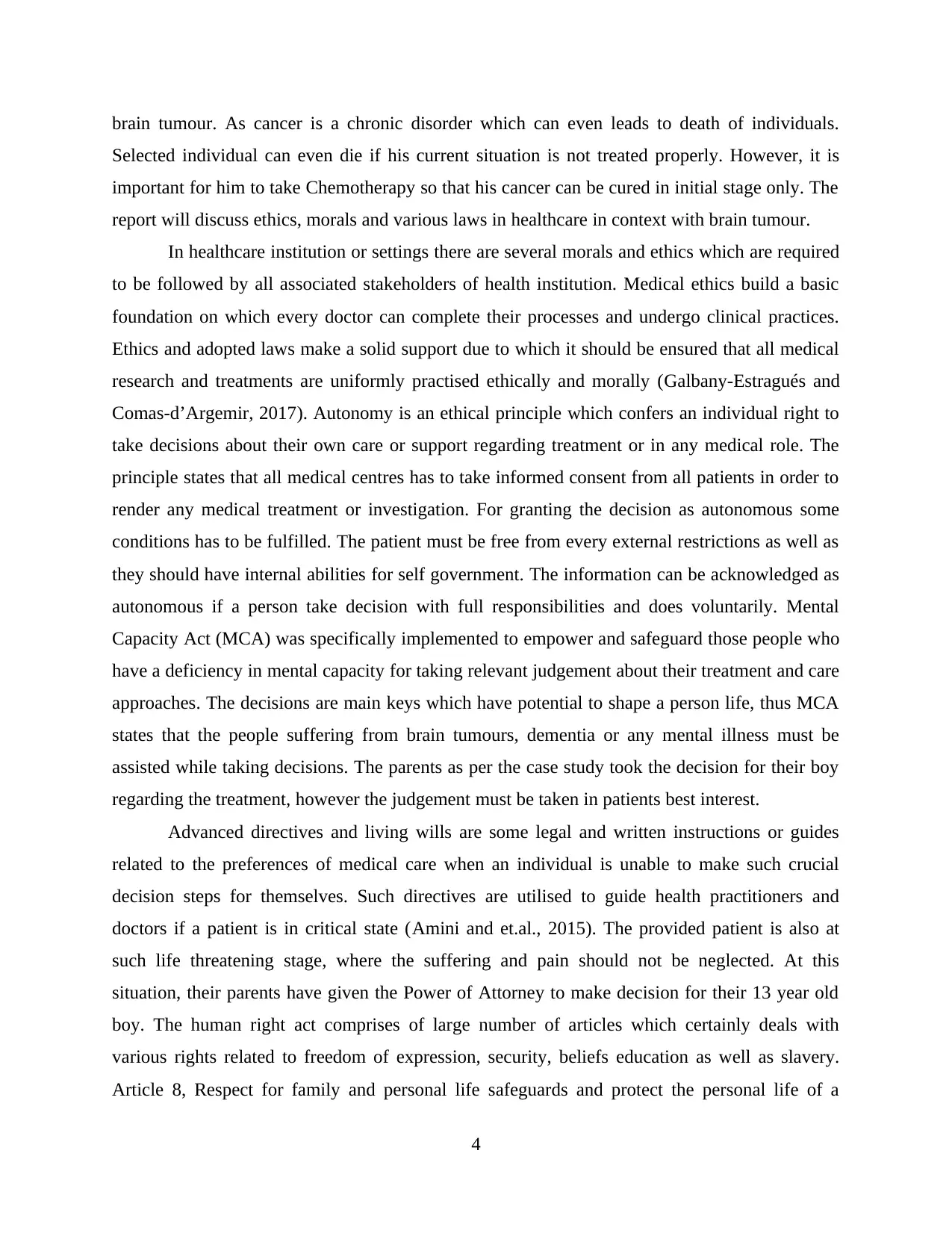
brain tumour. As cancer is a chronic disorder which can even leads to death of individuals.
Selected individual can even die if his current situation is not treated properly. However, it is
important for him to take Chemotherapy so that his cancer can be cured in initial stage only. The
report will discuss ethics, morals and various laws in healthcare in context with brain tumour.
In healthcare institution or settings there are several morals and ethics which are required
to be followed by all associated stakeholders of health institution. Medical ethics build a basic
foundation on which every doctor can complete their processes and undergo clinical practices.
Ethics and adopted laws make a solid support due to which it should be ensured that all medical
research and treatments are uniformly practised ethically and morally (Galbany-Estragués and
Comas-d’Argemir, 2017). Autonomy is an ethical principle which confers an individual right to
take decisions about their own care or support regarding treatment or in any medical role. The
principle states that all medical centres has to take informed consent from all patients in order to
render any medical treatment or investigation. For granting the decision as autonomous some
conditions has to be fulfilled. The patient must be free from every external restrictions as well as
they should have internal abilities for self government. The information can be acknowledged as
autonomous if a person take decision with full responsibilities and does voluntarily. Mental
Capacity Act (MCA) was specifically implemented to empower and safeguard those people who
have a deficiency in mental capacity for taking relevant judgement about their treatment and care
approaches. The decisions are main keys which have potential to shape a person life, thus MCA
states that the people suffering from brain tumours, dementia or any mental illness must be
assisted while taking decisions. The parents as per the case study took the decision for their boy
regarding the treatment, however the judgement must be taken in patients best interest.
Advanced directives and living wills are some legal and written instructions or guides
related to the preferences of medical care when an individual is unable to make such crucial
decision steps for themselves. Such directives are utilised to guide health practitioners and
doctors if a patient is in critical state (Amini and et.al., 2015). The provided patient is also at
such life threatening stage, where the suffering and pain should not be neglected. At this
situation, their parents have given the Power of Attorney to make decision for their 13 year old
boy. The human right act comprises of large number of articles which certainly deals with
various rights related to freedom of expression, security, beliefs education as well as slavery.
Article 8, Respect for family and personal life safeguards and protect the personal life of a
4
Selected individual can even die if his current situation is not treated properly. However, it is
important for him to take Chemotherapy so that his cancer can be cured in initial stage only. The
report will discuss ethics, morals and various laws in healthcare in context with brain tumour.
In healthcare institution or settings there are several morals and ethics which are required
to be followed by all associated stakeholders of health institution. Medical ethics build a basic
foundation on which every doctor can complete their processes and undergo clinical practices.
Ethics and adopted laws make a solid support due to which it should be ensured that all medical
research and treatments are uniformly practised ethically and morally (Galbany-Estragués and
Comas-d’Argemir, 2017). Autonomy is an ethical principle which confers an individual right to
take decisions about their own care or support regarding treatment or in any medical role. The
principle states that all medical centres has to take informed consent from all patients in order to
render any medical treatment or investigation. For granting the decision as autonomous some
conditions has to be fulfilled. The patient must be free from every external restrictions as well as
they should have internal abilities for self government. The information can be acknowledged as
autonomous if a person take decision with full responsibilities and does voluntarily. Mental
Capacity Act (MCA) was specifically implemented to empower and safeguard those people who
have a deficiency in mental capacity for taking relevant judgement about their treatment and care
approaches. The decisions are main keys which have potential to shape a person life, thus MCA
states that the people suffering from brain tumours, dementia or any mental illness must be
assisted while taking decisions. The parents as per the case study took the decision for their boy
regarding the treatment, however the judgement must be taken in patients best interest.
Advanced directives and living wills are some legal and written instructions or guides
related to the preferences of medical care when an individual is unable to make such crucial
decision steps for themselves. Such directives are utilised to guide health practitioners and
doctors if a patient is in critical state (Amini and et.al., 2015). The provided patient is also at
such life threatening stage, where the suffering and pain should not be neglected. At this
situation, their parents have given the Power of Attorney to make decision for their 13 year old
boy. The human right act comprises of large number of articles which certainly deals with
various rights related to freedom of expression, security, beliefs education as well as slavery.
Article 8, Respect for family and personal life safeguards and protect the personal life of a
4
Paraphrase This Document
Need a fresh take? Get an instant paraphrase of this document with our AI Paraphraser
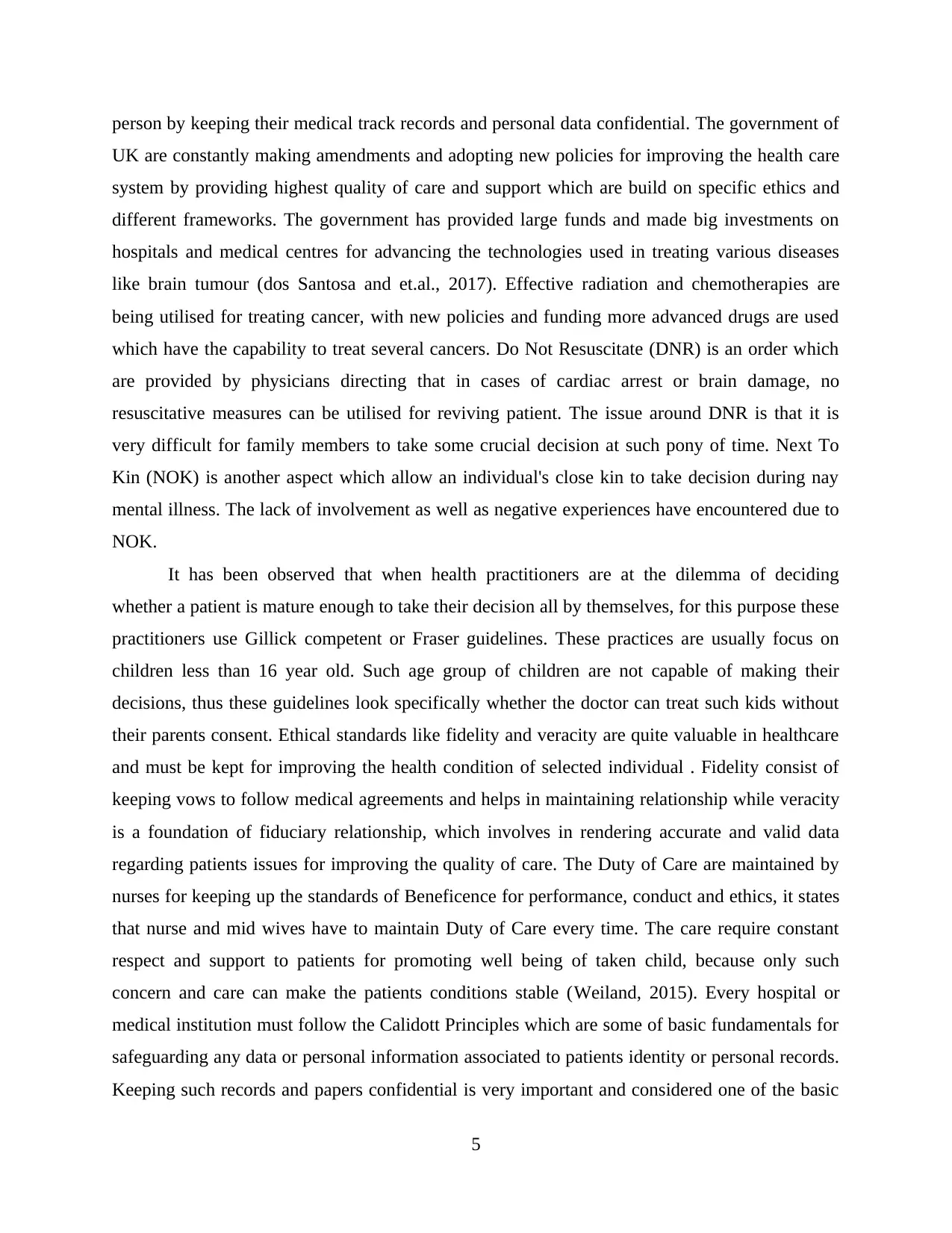
person by keeping their medical track records and personal data confidential. The government of
UK are constantly making amendments and adopting new policies for improving the health care
system by providing highest quality of care and support which are build on specific ethics and
different frameworks. The government has provided large funds and made big investments on
hospitals and medical centres for advancing the technologies used in treating various diseases
like brain tumour (dos Santosa and et.al., 2017). Effective radiation and chemotherapies are
being utilised for treating cancer, with new policies and funding more advanced drugs are used
which have the capability to treat several cancers. Do Not Resuscitate (DNR) is an order which
are provided by physicians directing that in cases of cardiac arrest or brain damage, no
resuscitative measures can be utilised for reviving patient. The issue around DNR is that it is
very difficult for family members to take some crucial decision at such pony of time. Next To
Kin (NOK) is another aspect which allow an individual's close kin to take decision during nay
mental illness. The lack of involvement as well as negative experiences have encountered due to
NOK.
It has been observed that when health practitioners are at the dilemma of deciding
whether a patient is mature enough to take their decision all by themselves, for this purpose these
practitioners use Gillick competent or Fraser guidelines. These practices are usually focus on
children less than 16 year old. Such age group of children are not capable of making their
decisions, thus these guidelines look specifically whether the doctor can treat such kids without
their parents consent. Ethical standards like fidelity and veracity are quite valuable in healthcare
and must be kept for improving the health condition of selected individual . Fidelity consist of
keeping vows to follow medical agreements and helps in maintaining relationship while veracity
is a foundation of fiduciary relationship, which involves in rendering accurate and valid data
regarding patients issues for improving the quality of care. The Duty of Care are maintained by
nurses for keeping up the standards of Beneficence for performance, conduct and ethics, it states
that nurse and mid wives have to maintain Duty of Care every time. The care require constant
respect and support to patients for promoting well being of taken child, because only such
concern and care can make the patients conditions stable (Weiland, 2015). Every hospital or
medical institution must follow the Calidott Principles which are some of basic fundamentals for
safeguarding any data or personal information associated to patients identity or personal records.
Keeping such records and papers confidential is very important and considered one of the basic
5
UK are constantly making amendments and adopting new policies for improving the health care
system by providing highest quality of care and support which are build on specific ethics and
different frameworks. The government has provided large funds and made big investments on
hospitals and medical centres for advancing the technologies used in treating various diseases
like brain tumour (dos Santosa and et.al., 2017). Effective radiation and chemotherapies are
being utilised for treating cancer, with new policies and funding more advanced drugs are used
which have the capability to treat several cancers. Do Not Resuscitate (DNR) is an order which
are provided by physicians directing that in cases of cardiac arrest or brain damage, no
resuscitative measures can be utilised for reviving patient. The issue around DNR is that it is
very difficult for family members to take some crucial decision at such pony of time. Next To
Kin (NOK) is another aspect which allow an individual's close kin to take decision during nay
mental illness. The lack of involvement as well as negative experiences have encountered due to
NOK.
It has been observed that when health practitioners are at the dilemma of deciding
whether a patient is mature enough to take their decision all by themselves, for this purpose these
practitioners use Gillick competent or Fraser guidelines. These practices are usually focus on
children less than 16 year old. Such age group of children are not capable of making their
decisions, thus these guidelines look specifically whether the doctor can treat such kids without
their parents consent. Ethical standards like fidelity and veracity are quite valuable in healthcare
and must be kept for improving the health condition of selected individual . Fidelity consist of
keeping vows to follow medical agreements and helps in maintaining relationship while veracity
is a foundation of fiduciary relationship, which involves in rendering accurate and valid data
regarding patients issues for improving the quality of care. The Duty of Care are maintained by
nurses for keeping up the standards of Beneficence for performance, conduct and ethics, it states
that nurse and mid wives have to maintain Duty of Care every time. The care require constant
respect and support to patients for promoting well being of taken child, because only such
concern and care can make the patients conditions stable (Weiland, 2015). Every hospital or
medical institution must follow the Calidott Principles which are some of basic fundamentals for
safeguarding any data or personal information associated to patients identity or personal records.
Keeping such records and papers confidential is very important and considered one of the basic
5
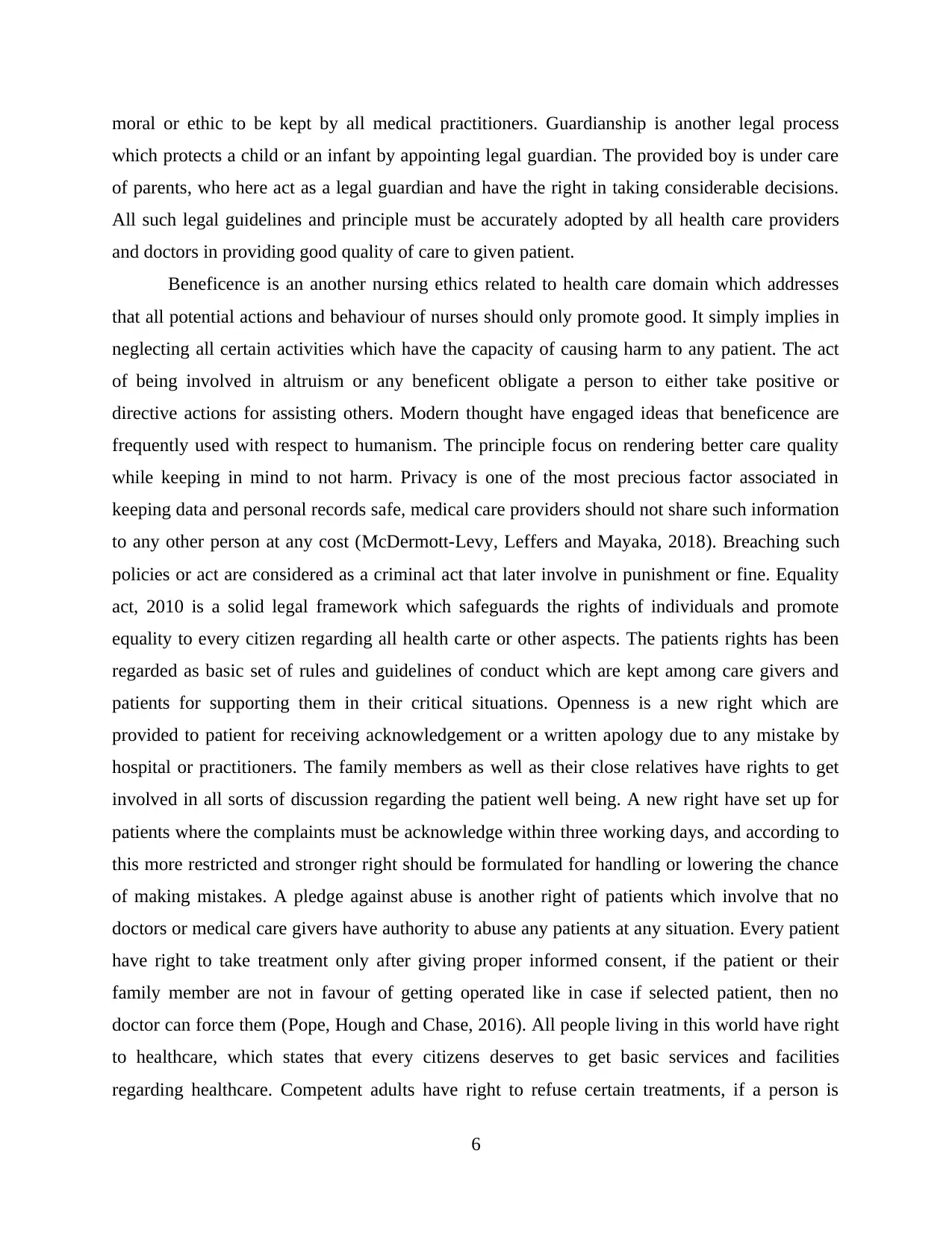
moral or ethic to be kept by all medical practitioners. Guardianship is another legal process
which protects a child or an infant by appointing legal guardian. The provided boy is under care
of parents, who here act as a legal guardian and have the right in taking considerable decisions.
All such legal guidelines and principle must be accurately adopted by all health care providers
and doctors in providing good quality of care to given patient.
Beneficence is an another nursing ethics related to health care domain which addresses
that all potential actions and behaviour of nurses should only promote good. It simply implies in
neglecting all certain activities which have the capacity of causing harm to any patient. The act
of being involved in altruism or any beneficent obligate a person to either take positive or
directive actions for assisting others. Modern thought have engaged ideas that beneficence are
frequently used with respect to humanism. The principle focus on rendering better care quality
while keeping in mind to not harm. Privacy is one of the most precious factor associated in
keeping data and personal records safe, medical care providers should not share such information
to any other person at any cost (McDermott-Levy, Leffers and Mayaka, 2018). Breaching such
policies or act are considered as a criminal act that later involve in punishment or fine. Equality
act, 2010 is a solid legal framework which safeguards the rights of individuals and promote
equality to every citizen regarding all health carte or other aspects. The patients rights has been
regarded as basic set of rules and guidelines of conduct which are kept among care givers and
patients for supporting them in their critical situations. Openness is a new right which are
provided to patient for receiving acknowledgement or a written apology due to any mistake by
hospital or practitioners. The family members as well as their close relatives have rights to get
involved in all sorts of discussion regarding the patient well being. A new right have set up for
patients where the complaints must be acknowledge within three working days, and according to
this more restricted and stronger right should be formulated for handling or lowering the chance
of making mistakes. A pledge against abuse is another right of patients which involve that no
doctors or medical care givers have authority to abuse any patients at any situation. Every patient
have right to take treatment only after giving proper informed consent, if the patient or their
family member are not in favour of getting operated like in case if selected patient, then no
doctor can force them (Pope, Hough and Chase, 2016). All people living in this world have right
to healthcare, which states that every citizens deserves to get basic services and facilities
regarding healthcare. Competent adults have right to refuse certain treatments, if a person is
6
which protects a child or an infant by appointing legal guardian. The provided boy is under care
of parents, who here act as a legal guardian and have the right in taking considerable decisions.
All such legal guidelines and principle must be accurately adopted by all health care providers
and doctors in providing good quality of care to given patient.
Beneficence is an another nursing ethics related to health care domain which addresses
that all potential actions and behaviour of nurses should only promote good. It simply implies in
neglecting all certain activities which have the capacity of causing harm to any patient. The act
of being involved in altruism or any beneficent obligate a person to either take positive or
directive actions for assisting others. Modern thought have engaged ideas that beneficence are
frequently used with respect to humanism. The principle focus on rendering better care quality
while keeping in mind to not harm. Privacy is one of the most precious factor associated in
keeping data and personal records safe, medical care providers should not share such information
to any other person at any cost (McDermott-Levy, Leffers and Mayaka, 2018). Breaching such
policies or act are considered as a criminal act that later involve in punishment or fine. Equality
act, 2010 is a solid legal framework which safeguards the rights of individuals and promote
equality to every citizen regarding all health carte or other aspects. The patients rights has been
regarded as basic set of rules and guidelines of conduct which are kept among care givers and
patients for supporting them in their critical situations. Openness is a new right which are
provided to patient for receiving acknowledgement or a written apology due to any mistake by
hospital or practitioners. The family members as well as their close relatives have rights to get
involved in all sorts of discussion regarding the patient well being. A new right have set up for
patients where the complaints must be acknowledge within three working days, and according to
this more restricted and stronger right should be formulated for handling or lowering the chance
of making mistakes. A pledge against abuse is another right of patients which involve that no
doctors or medical care givers have authority to abuse any patients at any situation. Every patient
have right to take treatment only after giving proper informed consent, if the patient or their
family member are not in favour of getting operated like in case if selected patient, then no
doctor can force them (Pope, Hough and Chase, 2016). All people living in this world have right
to healthcare, which states that every citizens deserves to get basic services and facilities
regarding healthcare. Competent adults have right to refuse certain treatments, if a person is
6
⊘ This is a preview!⊘
Do you want full access?
Subscribe today to unlock all pages.

Trusted by 1+ million students worldwide
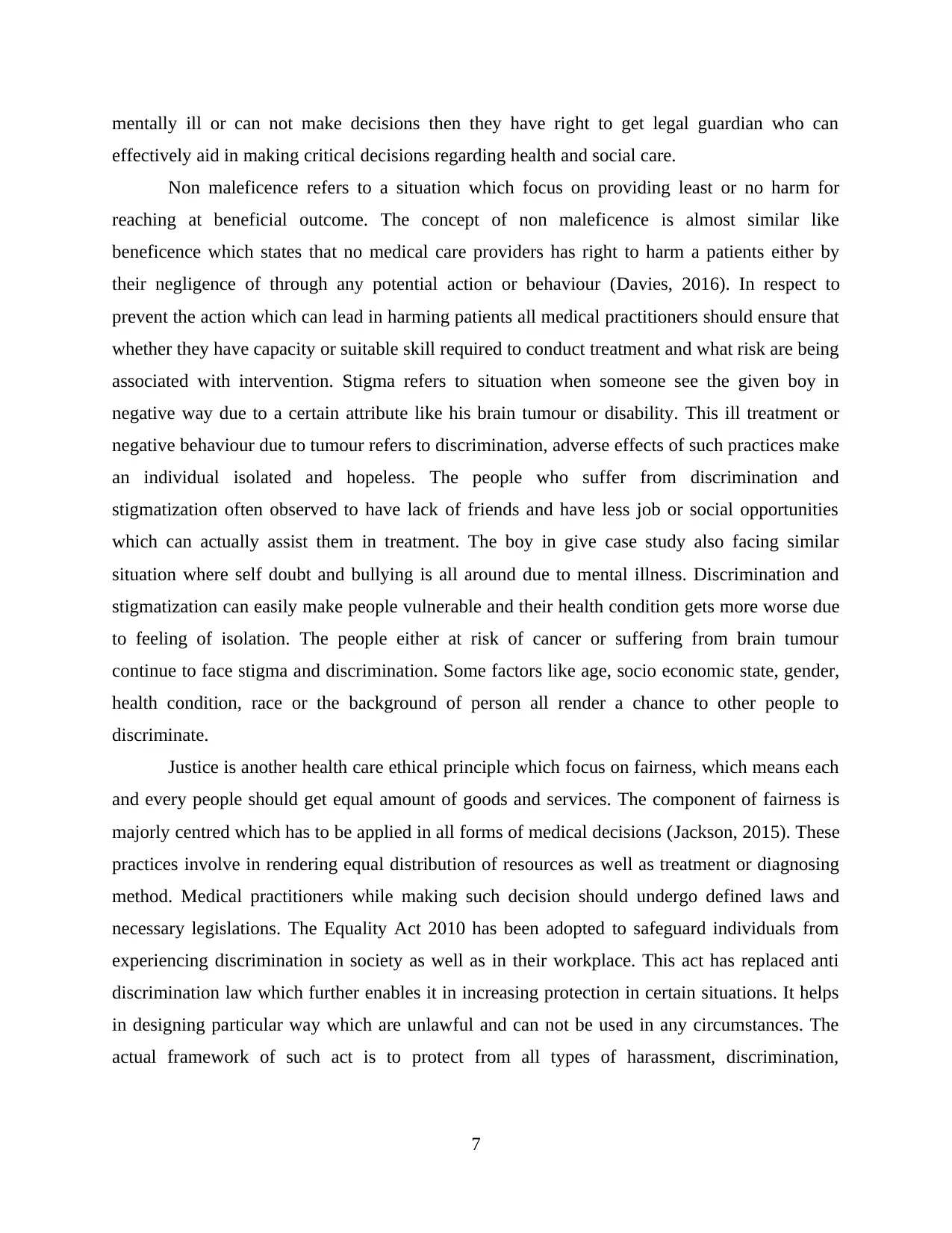
mentally ill or can not make decisions then they have right to get legal guardian who can
effectively aid in making critical decisions regarding health and social care.
Non maleficence refers to a situation which focus on providing least or no harm for
reaching at beneficial outcome. The concept of non maleficence is almost similar like
beneficence which states that no medical care providers has right to harm a patients either by
their negligence of through any potential action or behaviour (Davies, 2016). In respect to
prevent the action which can lead in harming patients all medical practitioners should ensure that
whether they have capacity or suitable skill required to conduct treatment and what risk are being
associated with intervention. Stigma refers to situation when someone see the given boy in
negative way due to a certain attribute like his brain tumour or disability. This ill treatment or
negative behaviour due to tumour refers to discrimination, adverse effects of such practices make
an individual isolated and hopeless. The people who suffer from discrimination and
stigmatization often observed to have lack of friends and have less job or social opportunities
which can actually assist them in treatment. The boy in give case study also facing similar
situation where self doubt and bullying is all around due to mental illness. Discrimination and
stigmatization can easily make people vulnerable and their health condition gets more worse due
to feeling of isolation. The people either at risk of cancer or suffering from brain tumour
continue to face stigma and discrimination. Some factors like age, socio economic state, gender,
health condition, race or the background of person all render a chance to other people to
discriminate.
Justice is another health care ethical principle which focus on fairness, which means each
and every people should get equal amount of goods and services. The component of fairness is
majorly centred which has to be applied in all forms of medical decisions (Jackson, 2015). These
practices involve in rendering equal distribution of resources as well as treatment or diagnosing
method. Medical practitioners while making such decision should undergo defined laws and
necessary legislations. The Equality Act 2010 has been adopted to safeguard individuals from
experiencing discrimination in society as well as in their workplace. This act has replaced anti
discrimination law which further enables it in increasing protection in certain situations. It helps
in designing particular way which are unlawful and can not be used in any circumstances. The
actual framework of such act is to protect from all types of harassment, discrimination,
7
effectively aid in making critical decisions regarding health and social care.
Non maleficence refers to a situation which focus on providing least or no harm for
reaching at beneficial outcome. The concept of non maleficence is almost similar like
beneficence which states that no medical care providers has right to harm a patients either by
their negligence of through any potential action or behaviour (Davies, 2016). In respect to
prevent the action which can lead in harming patients all medical practitioners should ensure that
whether they have capacity or suitable skill required to conduct treatment and what risk are being
associated with intervention. Stigma refers to situation when someone see the given boy in
negative way due to a certain attribute like his brain tumour or disability. This ill treatment or
negative behaviour due to tumour refers to discrimination, adverse effects of such practices make
an individual isolated and hopeless. The people who suffer from discrimination and
stigmatization often observed to have lack of friends and have less job or social opportunities
which can actually assist them in treatment. The boy in give case study also facing similar
situation where self doubt and bullying is all around due to mental illness. Discrimination and
stigmatization can easily make people vulnerable and their health condition gets more worse due
to feeling of isolation. The people either at risk of cancer or suffering from brain tumour
continue to face stigma and discrimination. Some factors like age, socio economic state, gender,
health condition, race or the background of person all render a chance to other people to
discriminate.
Justice is another health care ethical principle which focus on fairness, which means each
and every people should get equal amount of goods and services. The component of fairness is
majorly centred which has to be applied in all forms of medical decisions (Jackson, 2015). These
practices involve in rendering equal distribution of resources as well as treatment or diagnosing
method. Medical practitioners while making such decision should undergo defined laws and
necessary legislations. The Equality Act 2010 has been adopted to safeguard individuals from
experiencing discrimination in society as well as in their workplace. This act has replaced anti
discrimination law which further enables it in increasing protection in certain situations. It helps
in designing particular way which are unlawful and can not be used in any circumstances. The
actual framework of such act is to protect from all types of harassment, discrimination,
7
Paraphrase This Document
Need a fresh take? Get an instant paraphrase of this document with our AI Paraphraser
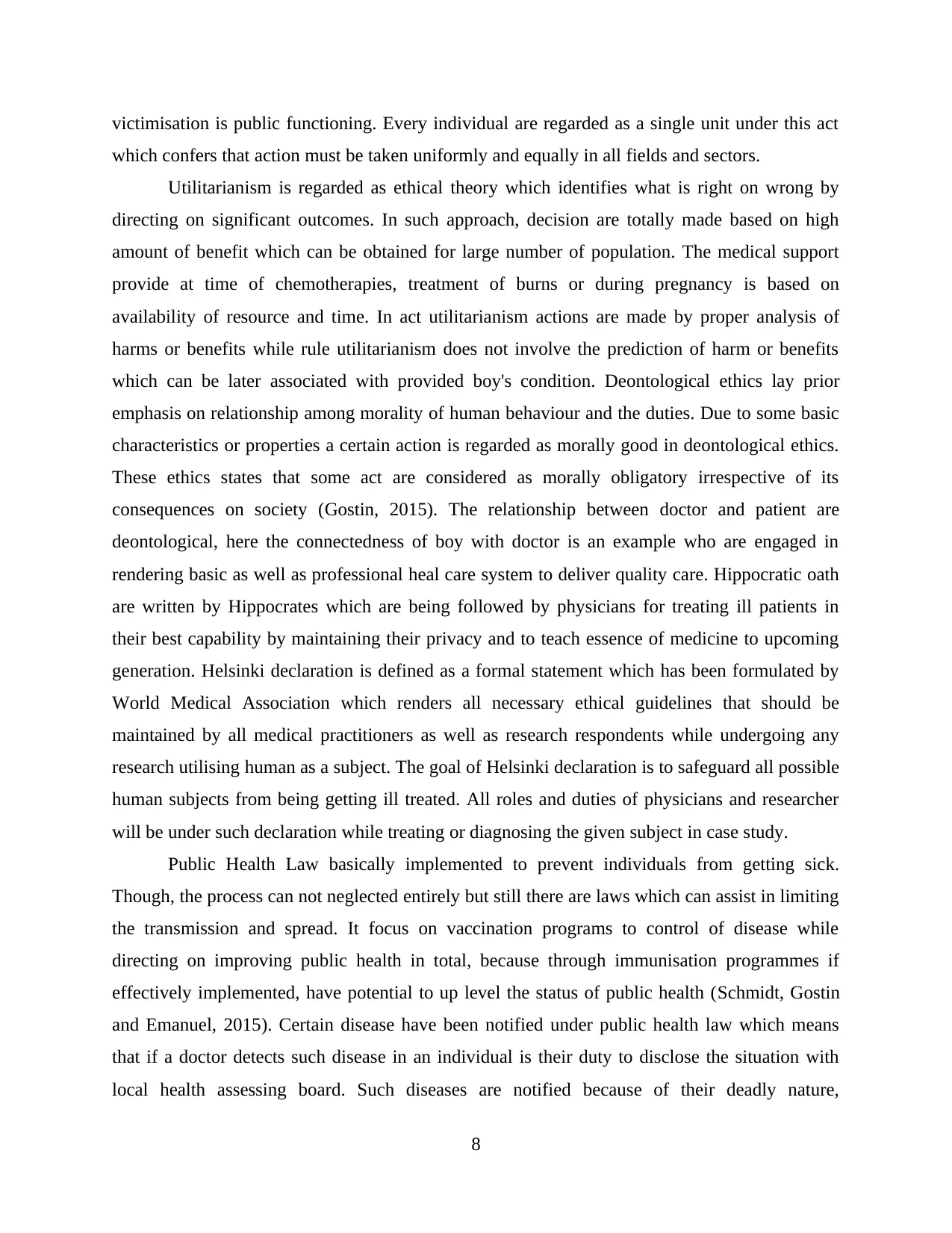
victimisation is public functioning. Every individual are regarded as a single unit under this act
which confers that action must be taken uniformly and equally in all fields and sectors.
Utilitarianism is regarded as ethical theory which identifies what is right on wrong by
directing on significant outcomes. In such approach, decision are totally made based on high
amount of benefit which can be obtained for large number of population. The medical support
provide at time of chemotherapies, treatment of burns or during pregnancy is based on
availability of resource and time. In act utilitarianism actions are made by proper analysis of
harms or benefits while rule utilitarianism does not involve the prediction of harm or benefits
which can be later associated with provided boy's condition. Deontological ethics lay prior
emphasis on relationship among morality of human behaviour and the duties. Due to some basic
characteristics or properties a certain action is regarded as morally good in deontological ethics.
These ethics states that some act are considered as morally obligatory irrespective of its
consequences on society (Gostin, 2015). The relationship between doctor and patient are
deontological, here the connectedness of boy with doctor is an example who are engaged in
rendering basic as well as professional heal care system to deliver quality care. Hippocratic oath
are written by Hippocrates which are being followed by physicians for treating ill patients in
their best capability by maintaining their privacy and to teach essence of medicine to upcoming
generation. Helsinki declaration is defined as a formal statement which has been formulated by
World Medical Association which renders all necessary ethical guidelines that should be
maintained by all medical practitioners as well as research respondents while undergoing any
research utilising human as a subject. The goal of Helsinki declaration is to safeguard all possible
human subjects from being getting ill treated. All roles and duties of physicians and researcher
will be under such declaration while treating or diagnosing the given subject in case study.
Public Health Law basically implemented to prevent individuals from getting sick.
Though, the process can not neglected entirely but still there are laws which can assist in limiting
the transmission and spread. It focus on vaccination programs to control of disease while
directing on improving public health in total, because through immunisation programmes if
effectively implemented, have potential to up level the status of public health (Schmidt, Gostin
and Emanuel, 2015). Certain disease have been notified under public health law which means
that if a doctor detects such disease in an individual is their duty to disclose the situation with
local health assessing board. Such diseases are notified because of their deadly nature,
8
which confers that action must be taken uniformly and equally in all fields and sectors.
Utilitarianism is regarded as ethical theory which identifies what is right on wrong by
directing on significant outcomes. In such approach, decision are totally made based on high
amount of benefit which can be obtained for large number of population. The medical support
provide at time of chemotherapies, treatment of burns or during pregnancy is based on
availability of resource and time. In act utilitarianism actions are made by proper analysis of
harms or benefits while rule utilitarianism does not involve the prediction of harm or benefits
which can be later associated with provided boy's condition. Deontological ethics lay prior
emphasis on relationship among morality of human behaviour and the duties. Due to some basic
characteristics or properties a certain action is regarded as morally good in deontological ethics.
These ethics states that some act are considered as morally obligatory irrespective of its
consequences on society (Gostin, 2015). The relationship between doctor and patient are
deontological, here the connectedness of boy with doctor is an example who are engaged in
rendering basic as well as professional heal care system to deliver quality care. Hippocratic oath
are written by Hippocrates which are being followed by physicians for treating ill patients in
their best capability by maintaining their privacy and to teach essence of medicine to upcoming
generation. Helsinki declaration is defined as a formal statement which has been formulated by
World Medical Association which renders all necessary ethical guidelines that should be
maintained by all medical practitioners as well as research respondents while undergoing any
research utilising human as a subject. The goal of Helsinki declaration is to safeguard all possible
human subjects from being getting ill treated. All roles and duties of physicians and researcher
will be under such declaration while treating or diagnosing the given subject in case study.
Public Health Law basically implemented to prevent individuals from getting sick.
Though, the process can not neglected entirely but still there are laws which can assist in limiting
the transmission and spread. It focus on vaccination programs to control of disease while
directing on improving public health in total, because through immunisation programmes if
effectively implemented, have potential to up level the status of public health (Schmidt, Gostin
and Emanuel, 2015). Certain disease have been notified under public health law which means
that if a doctor detects such disease in an individual is their duty to disclose the situation with
local health assessing board. Such diseases are notified because of their deadly nature,
8
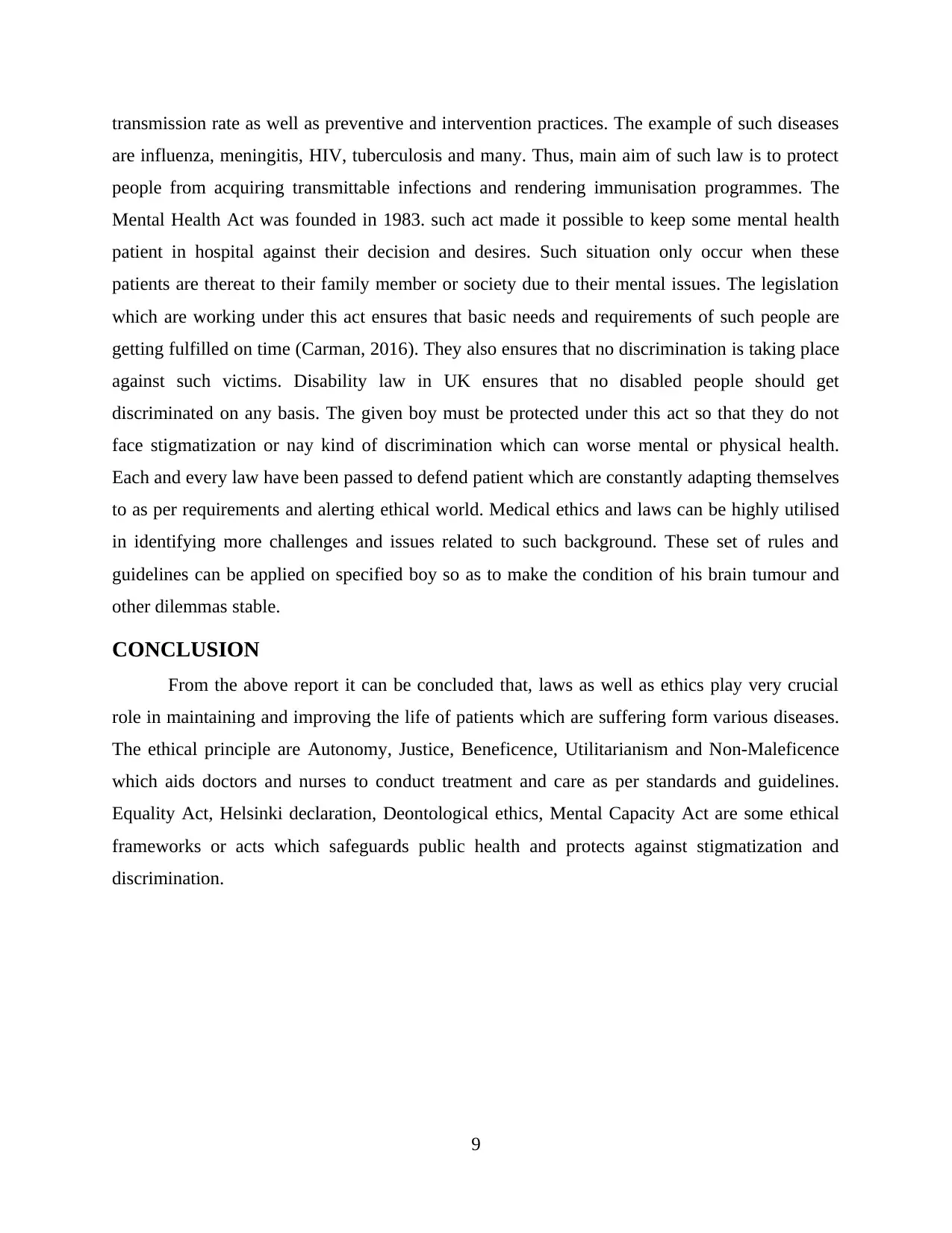
transmission rate as well as preventive and intervention practices. The example of such diseases
are influenza, meningitis, HIV, tuberculosis and many. Thus, main aim of such law is to protect
people from acquiring transmittable infections and rendering immunisation programmes. The
Mental Health Act was founded in 1983. such act made it possible to keep some mental health
patient in hospital against their decision and desires. Such situation only occur when these
patients are thereat to their family member or society due to their mental issues. The legislation
which are working under this act ensures that basic needs and requirements of such people are
getting fulfilled on time (Carman, 2016). They also ensures that no discrimination is taking place
against such victims. Disability law in UK ensures that no disabled people should get
discriminated on any basis. The given boy must be protected under this act so that they do not
face stigmatization or nay kind of discrimination which can worse mental or physical health.
Each and every law have been passed to defend patient which are constantly adapting themselves
to as per requirements and alerting ethical world. Medical ethics and laws can be highly utilised
in identifying more challenges and issues related to such background. These set of rules and
guidelines can be applied on specified boy so as to make the condition of his brain tumour and
other dilemmas stable.
CONCLUSION
From the above report it can be concluded that, laws as well as ethics play very crucial
role in maintaining and improving the life of patients which are suffering form various diseases.
The ethical principle are Autonomy, Justice, Beneficence, Utilitarianism and Non-Maleficence
which aids doctors and nurses to conduct treatment and care as per standards and guidelines.
Equality Act, Helsinki declaration, Deontological ethics, Mental Capacity Act are some ethical
frameworks or acts which safeguards public health and protects against stigmatization and
discrimination.
9
are influenza, meningitis, HIV, tuberculosis and many. Thus, main aim of such law is to protect
people from acquiring transmittable infections and rendering immunisation programmes. The
Mental Health Act was founded in 1983. such act made it possible to keep some mental health
patient in hospital against their decision and desires. Such situation only occur when these
patients are thereat to their family member or society due to their mental issues. The legislation
which are working under this act ensures that basic needs and requirements of such people are
getting fulfilled on time (Carman, 2016). They also ensures that no discrimination is taking place
against such victims. Disability law in UK ensures that no disabled people should get
discriminated on any basis. The given boy must be protected under this act so that they do not
face stigmatization or nay kind of discrimination which can worse mental or physical health.
Each and every law have been passed to defend patient which are constantly adapting themselves
to as per requirements and alerting ethical world. Medical ethics and laws can be highly utilised
in identifying more challenges and issues related to such background. These set of rules and
guidelines can be applied on specified boy so as to make the condition of his brain tumour and
other dilemmas stable.
CONCLUSION
From the above report it can be concluded that, laws as well as ethics play very crucial
role in maintaining and improving the life of patients which are suffering form various diseases.
The ethical principle are Autonomy, Justice, Beneficence, Utilitarianism and Non-Maleficence
which aids doctors and nurses to conduct treatment and care as per standards and guidelines.
Equality Act, Helsinki declaration, Deontological ethics, Mental Capacity Act are some ethical
frameworks or acts which safeguards public health and protects against stigmatization and
discrimination.
9
⊘ This is a preview!⊘
Do you want full access?
Subscribe today to unlock all pages.

Trusted by 1+ million students worldwide
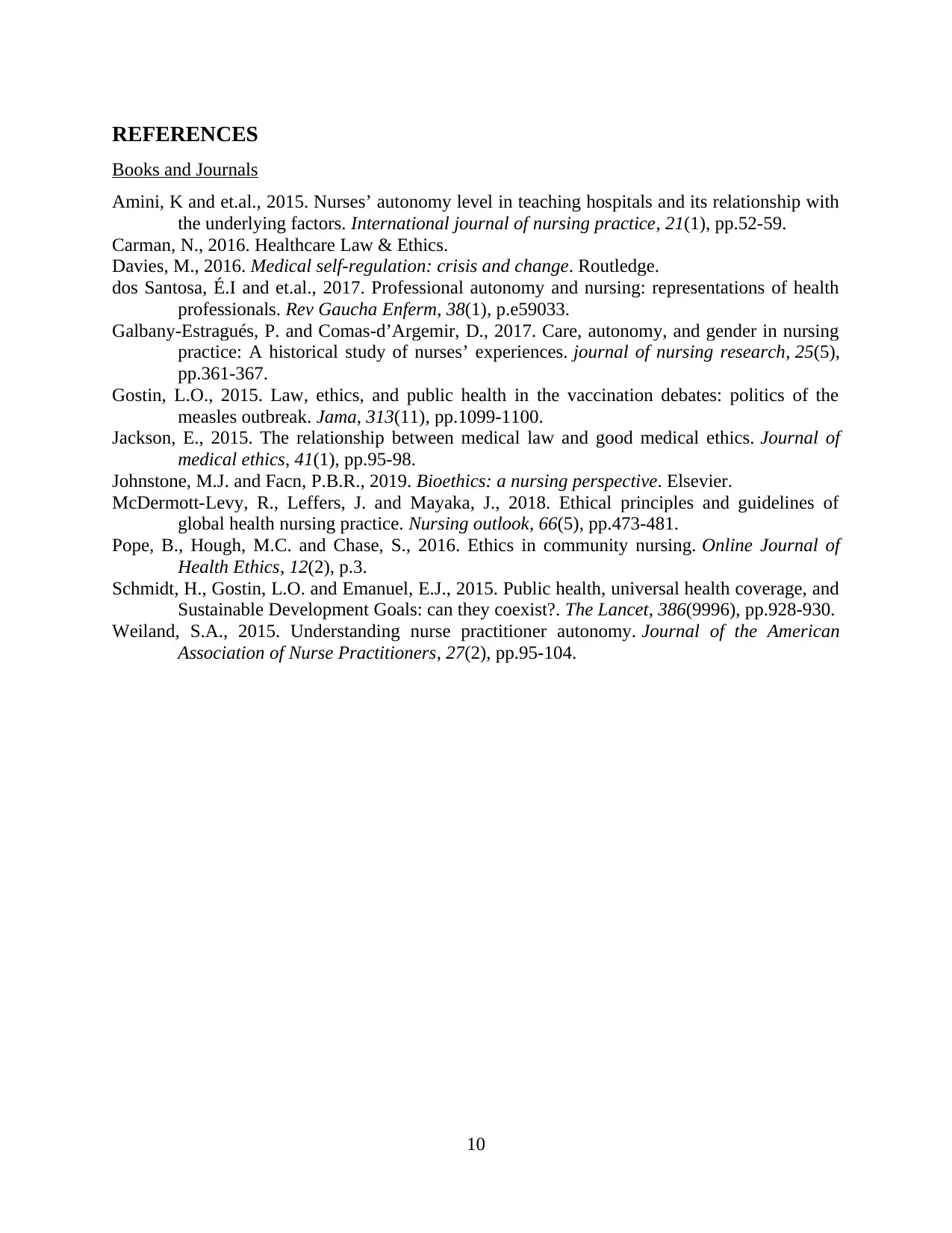
REFERENCES
Books and Journals
Amini, K and et.al., 2015. Nurses’ autonomy level in teaching hospitals and its relationship with
the underlying factors. International journal of nursing practice, 21(1), pp.52-59.
Carman, N., 2016. Healthcare Law & Ethics.
Davies, M., 2016. Medical self-regulation: crisis and change. Routledge.
dos Santosa, É.I and et.al., 2017. Professional autonomy and nursing: representations of health
professionals. Rev Gaucha Enferm, 38(1), p.e59033.
Galbany-Estragués, P. and Comas-d’Argemir, D., 2017. Care, autonomy, and gender in nursing
practice: A historical study of nurses’ experiences. journal of nursing research, 25(5),
pp.361-367.
Gostin, L.O., 2015. Law, ethics, and public health in the vaccination debates: politics of the
measles outbreak. Jama, 313(11), pp.1099-1100.
Jackson, E., 2015. The relationship between medical law and good medical ethics. Journal of
medical ethics, 41(1), pp.95-98.
Johnstone, M.J. and Facn, P.B.R., 2019. Bioethics: a nursing perspective. Elsevier.
McDermott-Levy, R., Leffers, J. and Mayaka, J., 2018. Ethical principles and guidelines of
global health nursing practice. Nursing outlook, 66(5), pp.473-481.
Pope, B., Hough, M.C. and Chase, S., 2016. Ethics in community nursing. Online Journal of
Health Ethics, 12(2), p.3.
Schmidt, H., Gostin, L.O. and Emanuel, E.J., 2015. Public health, universal health coverage, and
Sustainable Development Goals: can they coexist?. The Lancet, 386(9996), pp.928-930.
Weiland, S.A., 2015. Understanding nurse practitioner autonomy. Journal of the American
Association of Nurse Practitioners, 27(2), pp.95-104.
10
Books and Journals
Amini, K and et.al., 2015. Nurses’ autonomy level in teaching hospitals and its relationship with
the underlying factors. International journal of nursing practice, 21(1), pp.52-59.
Carman, N., 2016. Healthcare Law & Ethics.
Davies, M., 2016. Medical self-regulation: crisis and change. Routledge.
dos Santosa, É.I and et.al., 2017. Professional autonomy and nursing: representations of health
professionals. Rev Gaucha Enferm, 38(1), p.e59033.
Galbany-Estragués, P. and Comas-d’Argemir, D., 2017. Care, autonomy, and gender in nursing
practice: A historical study of nurses’ experiences. journal of nursing research, 25(5),
pp.361-367.
Gostin, L.O., 2015. Law, ethics, and public health in the vaccination debates: politics of the
measles outbreak. Jama, 313(11), pp.1099-1100.
Jackson, E., 2015. The relationship between medical law and good medical ethics. Journal of
medical ethics, 41(1), pp.95-98.
Johnstone, M.J. and Facn, P.B.R., 2019. Bioethics: a nursing perspective. Elsevier.
McDermott-Levy, R., Leffers, J. and Mayaka, J., 2018. Ethical principles and guidelines of
global health nursing practice. Nursing outlook, 66(5), pp.473-481.
Pope, B., Hough, M.C. and Chase, S., 2016. Ethics in community nursing. Online Journal of
Health Ethics, 12(2), p.3.
Schmidt, H., Gostin, L.O. and Emanuel, E.J., 2015. Public health, universal health coverage, and
Sustainable Development Goals: can they coexist?. The Lancet, 386(9996), pp.928-930.
Weiland, S.A., 2015. Understanding nurse practitioner autonomy. Journal of the American
Association of Nurse Practitioners, 27(2), pp.95-104.
10
1 out of 10
Your All-in-One AI-Powered Toolkit for Academic Success.
+13062052269
info@desklib.com
Available 24*7 on WhatsApp / Email
![[object Object]](/_next/static/media/star-bottom.7253800d.svg)
Unlock your academic potential
Copyright © 2020–2026 A2Z Services. All Rights Reserved. Developed and managed by ZUCOL.

